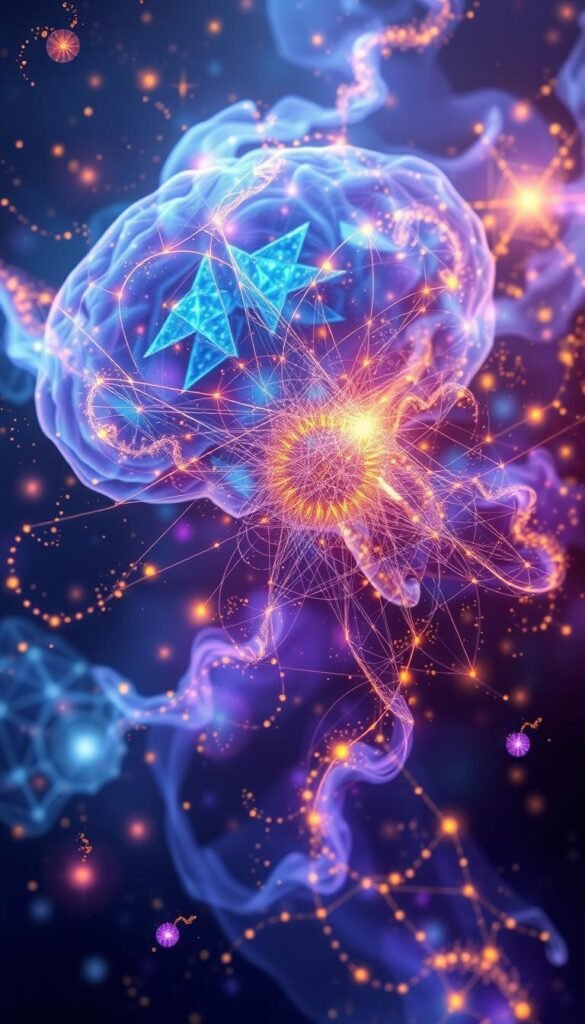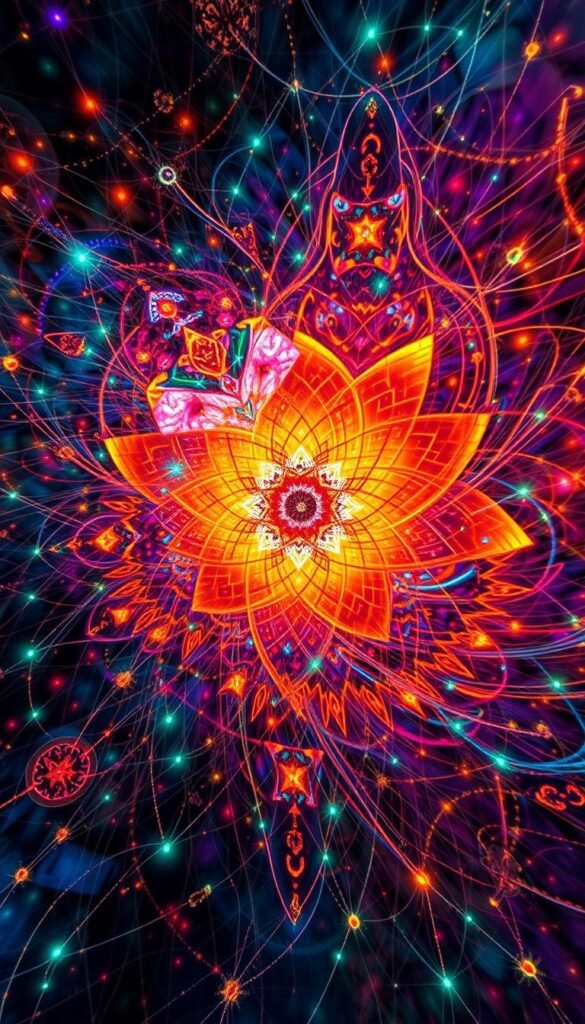Have you ever noticed repeating sequences like 11:11 or 07/07 and felt a sudden sense of wonder? Many of us experience this, drawn to the significance these patterns seem to hold. Whether it’s a clock, a license plate, or a receipt, these numbers often feel like more than just coincidence.
At FreeAstroScience.com, we believe in bridging the gap between spiritual wisdom and practical understanding. While some see these sequences as messages from the universe, science offers another perspective. Our brains are wired to seek patterns, a trait rooted in evolution. This process, known as apophenia, helps us make sense of the world around us.
From a psychological standpoint, this tendency to find meaning in randomness is natural. It’s part of what makes us human. Across cultures, numbers carry emotional resonance, often tied to traditions or beliefs. By exploring both the mystical and the scientific, we can better understand why these sequences captivate us so deeply.
Key Takeaways
- Repeating numbers like 11:11 often feel meaningful due to pattern-seeking tendencies.
- Apophenia explains why we find significance in random sequences.
- Our brains are naturally wired to seek and recognize patterns.
- Numbers hold emotional and cultural significance across the globe.
- Balancing spiritual and scientific perspectives offers a fuller understanding.
What Are Angel Numbers?
Do certain number sequences seem to follow you everywhere? These repeating or mirrored patterns, like 111 or 444, are often called angel numbers. Many believe they carry messages from the universe, offering guidance or reassurance in our daily lives.
Defining Angel Numbers
Angel numbers are specific sequences that appear repeatedly, such as 123 or 808. They are thought to hold spiritual meanings, often interpreted as signs from higher realms. This concept has roots in numerology, particularly the vibrational theories of Pythagoras, and has been popularized in modern times by Doreen Virtue’s book Angel Numbers 101. Many people believe that examining these sequences can lead to personal insights and guidance in their lives. By understanding angel number deeper meanings, individuals may uncover messages tailored to their unique circumstances and spiritual journeys. This can foster a stronger connection to their intuition and the universe, encouraging them to embrace their true path. Learning about various angel number meanings explained can enhance one’s understanding of these mystical messages. As individuals resonate with specific numbers, they may find clarity in their life choices and develop a deeper appreciation for the synchronicities that occur. This journey of exploration can ultimately empower individuals to trust in their decisions and strengthen their spiritual connection.
Common Examples of Angel Numbers
Different sequences carry unique significance. For example, 111 is often linked to new beginnings, while 444 symbolizes protection. Here’s a quick guide to some of the most common angel numbers and their meanings:
| Sequence | Meaning |
|---|---|
| 111 | New beginnings, intuition |
| 444 | Protection, security |
| 777 | Spiritual awakening |
These sequences often appear in everyday places, like digital clocks, receipts, or license plates. While they share similarities with general numerology, angel numbers are uniquely tied to spiritual messages. Cultural interpretations also vary—for instance, 666 is seen negatively in the West but holds different meanings in Eastern traditions.
The Psychology Behind Angel Numbers

Why do certain number sequences feel so meaningful to us? The answer lies in the way our mind processes information. We are naturally drawn to patterns, a trait that has deep evolutionary roots. This tendency to find meaning in randomness is known as apophenia.
Apophenia: The Mind’s Search for Patterns
Apophenia is the phenomenon of perceiving connections or patterns where none exist. It’s a survival mechanism that helped our ancestors detect threats or opportunities in their environment. For example, spotting a predator’s shape in the bushes could mean the difference between life and death.
Today, this same mind process leads us to notice repeating numbers like 111 or 444. Studies, such as those published in the Cortex journal, show that apophenia is particularly active in situations involving uncertainty. Gamblers, for instance, often attribute their wins to “lucky numbers,” reinforcing this cognitive bias.
Pareidolia: Seeing Meaning in Randomness
Another related phenomena is pareidolia, where we perceive familiar shapes or meanings in random stimuli. Think of seeing faces in clouds or the moon. This theory explains why we might interpret numbers as messages from the universe.
Research using fMRI scans has shown that specific brain regions light up when we recognize faces or patterns. This suggests that our brains are hardwired to seek meaning, even in abstract forms like numbers. While this can lead to false positives, it also highlights the incredible adaptability of the human mind.
Scientific Views on Angel Numbers

Have you ever wondered why specific number sequences catch your attention? While many attribute spiritual significance to these patterns, science offers a different lens. Our brains are wired to seek order in chaos, a trait that shapes how we interpret the world around us.
Cognitive Psychology and Pattern Recognition
At the core of this phenomenon is our mind‘s ability to recognize patterns. This process, known as apophenia, explains why we often see connections where none exist. According to Shermer’s patternicity theory, this tendency evolved as a survival mechanism, helping our ancestors detect threats or opportunities.
Modern studies, like those published in Cortex, show that apophenia is particularly active in uncertain situations. For example, gamblers often attribute their wins to “lucky numbers,” reinforcing this cognitive bias. Our brains are hardwired to find meaning, even in abstract forms like numbers.
The Role of Confirmation Bias
Another key factor is confirmation bias, where we selectively remember “hits” and ignore “misses.” If you notice the number 111 during a significant moment, you’re more likely to remember it than other random sequences. This bias amplifies the significance we attach to these patterns.
A USA Today survey found that 65% of respondents reported noticing repeating numbers regularly. This highlights how common these experiences are, even if their meaning is subjective. While these patterns may feel meaningful, they often stem from our brain’s natural tendencies rather than external messages.
| Psychological Phenomenon | Explanation |
|---|---|
| Apophenia | Perceiving patterns in randomness |
| Confirmation Bias | Selective memory of meaningful instances |
| Pareidolia | Seeing familiar shapes in abstract forms |
While these experiences can feel profound, they often reflect our brain’s innate processes. Understanding the science behind them helps us appreciate why these patterns captivate us so deeply.
Historical and Cultural Context

Numbers have long been more than just symbols; they carry deep cultural and spiritual meanings. Across the world, different societies have assigned unique significance to numerical patterns, shaping traditions, beliefs, and even daily practices. This universal fascination with numbers has roots in ancient civilizations and continues to evolve in modern times.
Numerology: From Pythagoras to Modern Times
The concept of numerology dates back to ancient times, with early records found in Babylonian omen texts. Pythagoras, the Greek philosopher, later formalized the idea that numbers hold vibrations and spiritual meanings. His teachings influenced Western thought, laying the groundwork for modern numerology.
In the New Age movement, numerology experienced a revival, blending ancient wisdom with contemporary spirituality. Today, it’s a popular tool for self-discovery and guidance, showing how this ancient practice remains relevant.
Numbers in Different Cultures
Cultural interpretations of numbers vary widely. In Western traditions, the number 7 symbolizes perfection, while in Chinese culture, 8 represents prosperity and wealth. Similarly, the Hindu-Arabic numeral system, adopted globally, contrasts with the Mayan system, which used a base-20 structure.
Here’s a quick look at how numbers are viewed across cultures:
- Western Numerology: 7 is seen as a sacred number, often linked to spiritual awakening.
- Chinese Numerology: 8 is considered lucky, associated with financial success.
- Kabbalistic Gematria: Hebrew letters are assigned numerical values, creating spiritual connections.
These diverse interpretations highlight the universal significance of numbers, bridging cultures and generations.
The Impact of Angel Numbers on Personal Beliefs

How do repeating number sequences shape our personal beliefs and daily lives? For many, these patterns serve as spiritual anchors, offering a sense of inner peace and connection to something greater. Whether it’s 111 signaling new beginnings or 444 providing a sense of protection, these numbers often become meaningful touchstones in our life. As individuals delve deeper into the spiritual meaning of number patterns, they often discover personalized interpretations that resonate with their unique journeys. This exploration can not only enhance their understanding of their own lives but also foster a sense of community among those who share similar experiences. Ultimately, these sequences serve as reminders of hope and guidance in an ever-changing world.
Spiritual Anchors for Inner Peace
Angel numbers can act as guidance during uncertain times. Many people find comfort in interpreting these sequences as messages from the universe, helping them navigate challenges with a sense of purpose. This belief can be particularly powerful in grief counseling, where numbers like 777 might symbolize spiritual awakening and hope. Furthermore, incorporating angel numbers in decision making can provide clarity and confidence when faced with tough choices. People often report that these numbers guide them toward positive outcomes, offering reassurance during moments of doubt. Ultimately, recognizing these sequences can empower individuals to trust their intuition and make choices aligned with their true selves.
Research from Psychology Today highlights how spiritual coping mechanisms, including the use of angel numbers, can reduce anxiety and foster resilience. By focusing on these patterns, individuals often feel more grounded and connected to their beliefs.
Emotional Reassurance and Cognitive Benefits
Beyond spiritual comfort, angel numbers can offer emotional reassurance. For example, repeating affirmations tied to numbers like 444 can help reduce anxiety by reinforcing feelings of safety and protection. This practice aligns with mindfulness techniques, encouraging individuals to stay present and aware of their surroundings.
Online communities centered around angel numbers also play a role in building connections. Sharing experiences and interpretations fosters a sense of belonging, which can be incredibly therapeutic. As Vivify Tribe’s holistic approach suggests, these groups provide both emotional support and practical guidance.
“Angel numbers remind us that we’re not alone. They’re like little whispers from the universe, guiding us toward our true path.”
From a neuropsychological perspective, the perceived guidance from these numbers can activate brain regions associated with positive emotions and stress relief. This makes them a valuable tool for those seeking balance and clarity in their life.
- Therapeutic applications in grief counseling
- Mindfulness enhancement through number awareness
- Community-building in online angel number groups
- Neuropsychological benefits of perceived guidance
- Case study: Anxiety reduction through 444 affirmations
Conclusion
What makes certain sequences feel so deeply personal? Whether you see them as spiritual guidance or a product of your mind’s pattern-seeking nature, their significance lies in how they resonate with you. Across cultures and history, numbers have carried profound meaning, reflecting the human need to find order in the world.
From a neurological perspective, our brains are wired to detect patterns, a trait rooted in survival. Yet, the spiritual concept of these sequences offers comfort and connection. This duality reminds us that meaning is often subjective, shaped by personal experiences and beliefs.
To explore this further, consider journaling your encounters with these patterns. Reflect on how they align with your emotions or decisions. This practice can deepen your understanding without falling into obsessive pattern-seeking.
Ultimately, these sequences act as mirrors, reflecting our cognitive architecture and inner reality. By balancing ancient wisdom with modern psychology, we can appreciate their role in our lives while staying grounded in the present.
